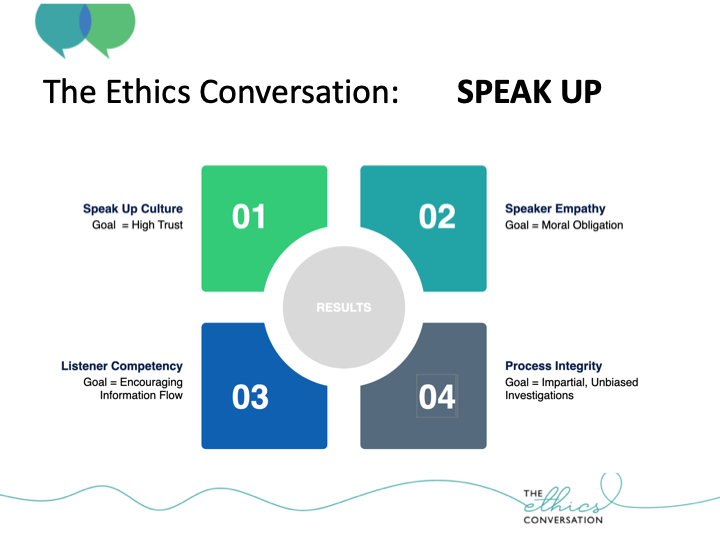Book A Demo
To book a demo please complete the form and we will come back to you shortly.
To book a demo please complete the form and we will come back to you shortly.
New Zealand

Company culture can make or break a whistleblower, writes ethics expert and director of the Ethics Conversation, Jane Arnott MNZM…
As a litmus test on leadership, culture provides the foundation from which a whistleblower may choose to follow internal processes and observe policy, or not.
It’s a dog-eat-dog world – so creating a positive culture for dogs at play or work is vital.
It is overly troubling, therefore when, in either the private or public sector, an employee makes it clear that neither leadership, nor culture, nor process, nor policy makes internal whistleblowing worth their while.
Instead, the preferred route for calling out suspect behaviour is anonymous and direct to the top of the food chain. In a recent gnawing example involving New Zealand’s Department of Immigration, this meant the Minister for Immigration, the Hon Andrew Little.
In what must be seen as a massive erosion of the trust and confidence placed in the public sector – and in the Department of Immigration – an urgent independent review of how the Accredited Employer Work Visa (AEWV) scheme is being administered is now underway.
The allegations read as if from a comic book. Applicant checking was apparently frowned upon and even pets were applying.
Although direct approaches to approved entities, including a Minister’s office, are allowed by way of the the Protected Disclosures Act 2022, when a whistleblower seeks to remain anonymous you can be sure that fear and distrust is uppermost in their mind.
The implication is that despite the employee being faced with mismanagement at the level of serious wrongdoing or gross misconduct, concern for their personal well-being becomes the priority.
It is not uncommon for whistleblowers to be well-advised to avoid traceability if the process and culture that surrounds them doesn’t appear safe.
Public sector employees who don’t trust their public sector employers are a thorn in the side of every incoming or incumbent government.
This month it’s the Department of Immigration. But the Department of Corrections and the Defence Ministry – along with the Fire Service – have also either fallen foul of whistleblowing processes or are struggling to create and maintain a strong ethical culture.
And so, another independent review gets underway.
Clearly someone, somewhere in the public service would benefit from having an open mind and a willingness to reflect on how speaking up can be better encouraged, managed and implemented.
Compliance is never a given when instructions are challenged. When bad instructions with wide-ranging consequences are issued a safety valve is essential. Being able to turn to a purpose-built and independent means to speak up is reassuring. Give the power and reach of the public service, this cannot be understated.
Independent, professional external agencies such as Report it Now® have a valuable role to play.
The doubt and fear that comes from knowing a senior manager well and witnessing their attitude to information they don’t like can be intimidating. Similarly, when managers face situations where their authority and control sinks to flakey, and their temper rises accordingly, a strong warning is sent – don’t speak up.
By contrast, interacting with a professional and standalone company that provides professional and intuitive guidance for reporting, either online or through competent employees, is infinitely reassuring.
A big challenge faced by public or private sector employees when needing to speak up is the risk of defensiveness. This is often inherent in the one person tasked with listening.
Many managers are invested in their position, responsibilities and colleagues. They do not necessarily welcome alternate points of view, nor unsavoury allegations.
Such inappropriate responses are impossible however, when reporting, developing the paper trail and triggering a process is enabled by an independent entity.
Concerns about New Zealand’s public sector and often lily-livered encouragement of internal speaking up is amplified by examining the model standards as per the Public Service Commission website. Worryingly these fail to address the significance or effort needed to encourage a speak up culture.
Instead ‘getting the foundations right from the start’ refers to organisational commitment to leadership, raising awareness and supporting staff, ‘making sure processes are robust,’ refers to systems – monitoring, reporting, investigating and communicating while ‘keeping people safe,’ refers to trust – that organisations will act, tailored and dedicated support will be provided and protections from reprisal prioritised.
Culture, however:
1. is the sum total of shared beliefs, attitudes, values, standards, purposes and behaviours.
2. underpins policy and processes, providing the sense of belonging that ensures they are willingly upheld.
3. operationalises values that are central to a speak up culture.
On this basis a speak up culture must be a priority.
The Ethics Conversation approach, as promoted in their speak up workshops, involves recognising the impact of four key components which are outlined in the chart below. The starting point is putting in place a speak up culture with the goal of building trust.
Developing speaker empathy aims to reinforce the moral obligation to speak up through a better understanding of the emotions at play – such as apprehension and fear. Ensuring listener competency lends itself to generating information flow by identifying managers with strong people-skills who are capable of putting loyalties or personal judgements aside. These employees contribute to the process through becoming speak up champions.
Ideally the first three components will have gained traction before process integrity, a fourth component aimed at achieving impartial and unbiased investigations is developed.

Report it Now® has this understanding at its core and works alongside its client base to secure alignment.
The importance of culture across the entire fabric of New Zealand’s largest and most influential employer, the public service, cannot be overlooked and cannot be left to chance.
To allow this situation to continue is to promote the concept of ministerial whistleblowing to a pedigree worthy only of show dogs – very good on paper but with dubious performance if not misaligned credentials.
New Zealand needs good, solid working dogs in the form of trustworthy public servants throughout the public service and evidence of speak up cultures that prove ‘barking’ will not incur any retaliatory bite.
It’s a case for a dog whisperer – and an independent one should be the judge.